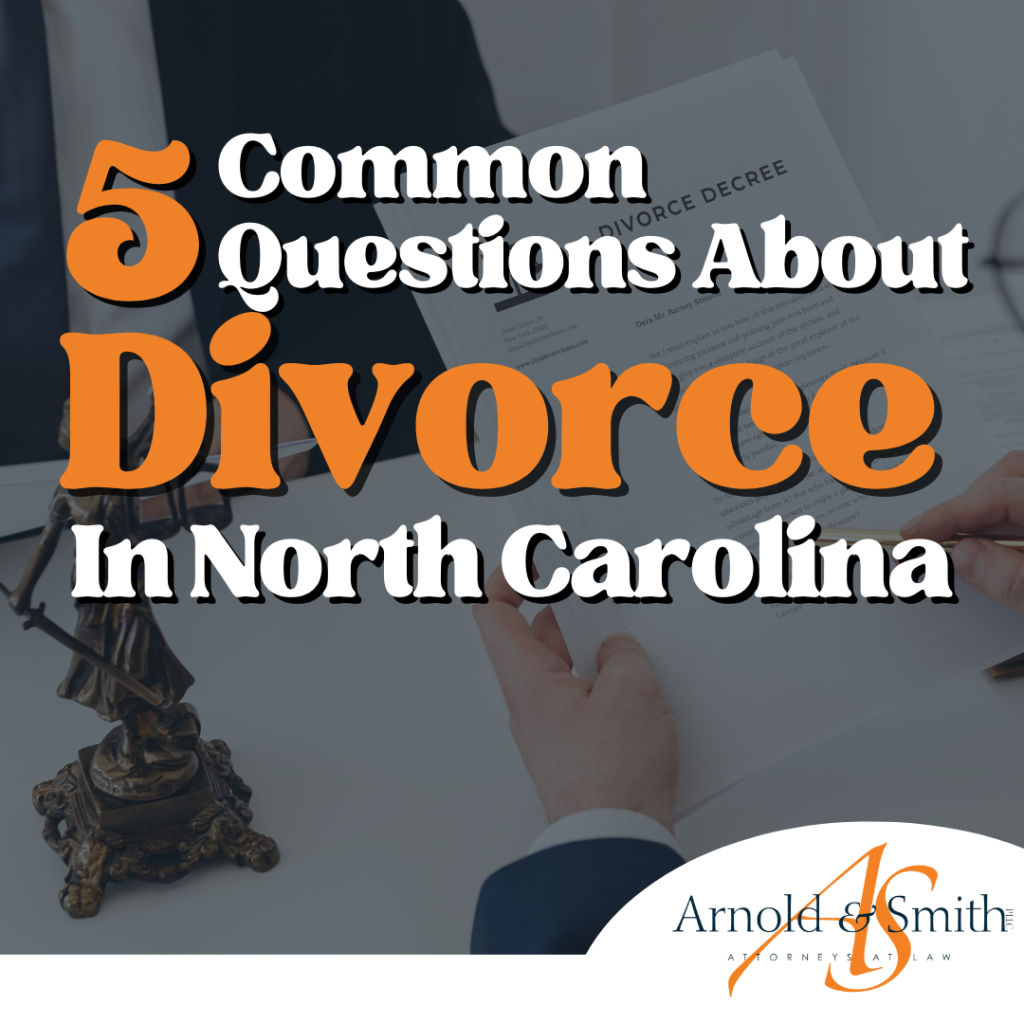 Five Common Questions About Divorce in North Carolina
Five Common Questions About Divorce in North Carolina
Divorce can be complex and overwhelming. The decision to end your marriage is one of the most difficult decisions you will make, and it will have a long-term impact on you and your family. The best place to start the process is to learn as much as you can about what to expect with divorce in North Carolina.
What is No-Fault Divorce in North Carolina?
North Carolina no longer requires couples to choose grounds or reasons for divorce. Instead, they allow no-fault divorce. This means that a couple may end their marriage because the marriage is irretrievably broken and the couple has irreconcilable differences. No-fault divorce is simpler and easier because you do not have to place blame on the other party. A no-fault divorce does not require you to prove that the other party breached the marital contract. North Carolina has a required separation period before you can complete the absolute divorce process.
What is the Required Separation Period?
When a couple wishes to get an absolute divorce, they must follow the strict requirements. A couple must live apart for a period of at least one year before they can go through with a divorce. A couple cannot live under the same roof during this time. The separation period is designed to allow couples to make sure that they wish to end the marriage. If you get back together during this period, you will need to start the separation period over if you decide to divorce.
What is Absolute Divorce?
In North Carolina, there are two types of divorce: divorce from bed and board and absolute divorce. Divorce from bed and board is the equivalent of a legal separation and does not result in the final end of your marriage. Absolute divorce is the typical option for those who wish to end their marriages. Absolute divorce results in a complete end of your marriage, and once finalized, you will be free to remarry if you choose.
Is North Carolina a Community Property State?
North Carolina is an equitable distribution state. This means that the assets and debts that you accumulated during your marriage belong to both of you. The law allows for a fair and equitable distribution of marital property. Marital property includes anything you acquired after you got married. Separate property includes anything you owned before you wed, as well as some exceptions to the marital property rule. For instance, inheritance and gifts that you received separately while you were married are typically considered separate property and are not included in the division of assets. A judge will review the division of property that you and your spouse agreed to as part of the settlement.
Is North Carolina a 50/50 Child Custody State?
In North Carolina, both parents are allowed custody of their child. Legal custody is the ability to make decisions on behalf of the child, such as those regarding education, religion, and health care, for example. Physical custody refers to where the child resides. One parent may have primary custody, while the other parent may have regular visitation. A parenting plan will give you guidance on the way your schedule will work. Typically, the non-custodial parent pays child support.
If you have made the decision to end your marriage, we are here to help. Call us today at Arnold & Smith, PLLC, at (704) 370-2828 to discuss your needs with our legal team.
The family law practice group at Arnold & Smith, PLLC includes two Board-Certified Family Law specialists and one Child Welfare Law specialist, as well as several attorneys with many years of family law experience that are committed to providing a powerful voice to individuals facing the often-tumultuous issues in this area of law. The range of issues our family law clients may be facing include pre- and post-nuptial agreements; separation agreements; post-separation support; child support (both temporary and permanent); absolute divorce; divorce from bed and board; military divorce; equitable distribution of assets; child custody (both temporary and permanent); retirement benefits and divorce; alimony and spousal support; adoption; and emancipation. Because this area of the law is usually emotionally charged and complicated, the family law attorneys at Arnold & Smith, PLLC act with the utmost dedication to ensure that each client understands his or her options, and then act to achieve the best result possible for that client’s particular situation.
Source:
https://www.nccourts.gov/help-topics/divorce-and-marriage/separation-and-divorce
https://www.ncleg.net/enactedlegislation/statutes/html/bysection/chapter_50/gs_50-20.html
Image Credit:
https://www.freeimages.com/photo/knife-cutting-through-bride-and-groom-on-wedding-cake-2289594
See Our Related Video from our YouTube channel:
https://www.youtube.com/user/ArnoldSmithPLLC?feature=watch
See Our Related Blog Posts:
 Charlotte Divorce Lawyer Blog
Charlotte Divorce Lawyer Blog


